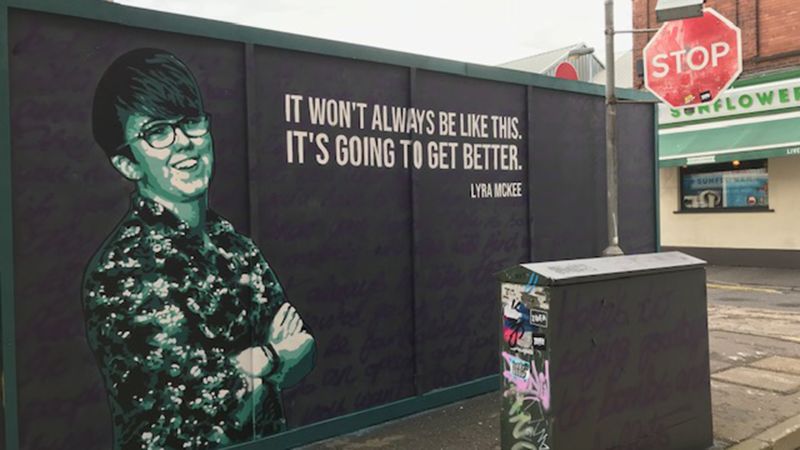A word of warning: musically speaking, these songs are of variable quality and some of them are not good at all. I'm not expecting anyone to listen to these tunes over and over and feel that they have discovered some lost classics (although I think some of these songs are worthy of a wider audience). My hope more is that people will find the songs and the accompanying text an informative and interesting way of exploring these events that are now starting to recede into history.
But first a history lesson on the origins of the conflict, with the massive caveat that the historiography of the Troubles is itself a contested subject. In the 1920s Ireland was partitioned, with 26 counties becoming a self-governing free state (and later a fully independent republic), while six counties in the north east remained part of the United Kingdom as Northern Ireland, with its own devolved parliament. The Unionist-Protestant majority monopolised power in Northern Ireland, keeping the Nationalist-Catholic majority marginalised, discriminating against them in the workplace and the provision of social housing. The Irish Republican Army (IRA) launched periodic military campaigns to force the British out of the Six Counties; these proved ineffectual and by the mid-1960s the IRA had tacitly given up on the armed struggle and was devoting its efforts more towards non-violent engagement with social issues.
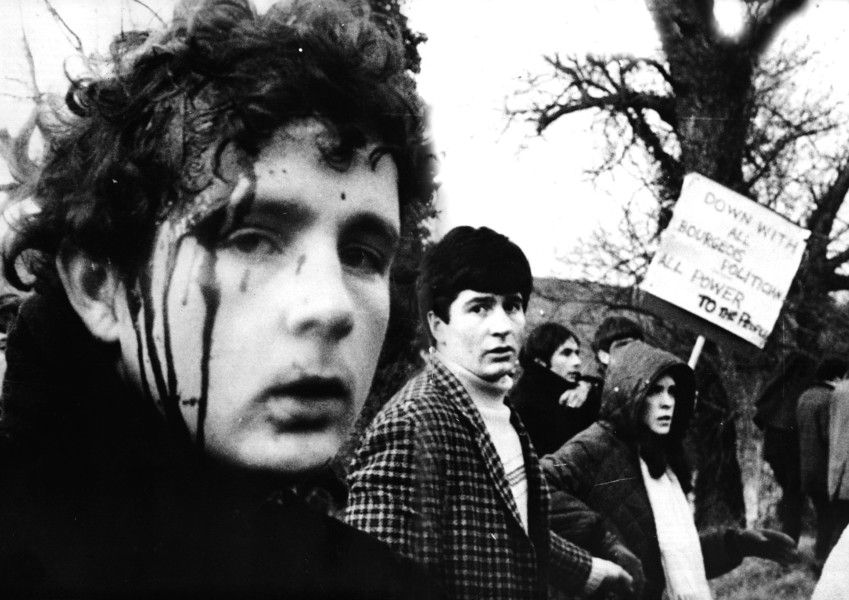 In the 1960s a new civil rights movement emerged through which members of the Catholic-Nationalist community sought greater equality in the life of Northern Ireland. Inspired by the African American civil rights movement, this campaign used sit-ins, marches and civil disobedience to advance its goals. Members of the Protestant-Unionist community were unnerved, fearing the loss of their privileges but also concerned that the civil rights movement was simply a ruse by the IRA. At the time Northern Ireland had a reformist prime minister, but he was moving too slowly to satisfy the demands of the increasingly radicalised civil rights movement while also contributing to the sense of his own Unionist community that events were spinning out of control. Loyalists (hardline Unionists) reacted violently against the civil rights movement, attacking marchers (often with the overt or tacit support of the local police). Loyalist paramilitaries launched a bombing campaign.
In the 1960s a new civil rights movement emerged through which members of the Catholic-Nationalist community sought greater equality in the life of Northern Ireland. Inspired by the African American civil rights movement, this campaign used sit-ins, marches and civil disobedience to advance its goals. Members of the Protestant-Unionist community were unnerved, fearing the loss of their privileges but also concerned that the civil rights movement was simply a ruse by the IRA. At the time Northern Ireland had a reformist prime minister, but he was moving too slowly to satisfy the demands of the increasingly radicalised civil rights movement while also contributing to the sense of his own Unionist community that events were spinning out of control. Loyalists (hardline Unionists) reacted violently against the civil rights movement, attacking marchers (often with the overt or tacit support of the local police). Loyalist paramilitaries launched a bombing campaign.
In August 1969 Northern Ireland exploded, with rioting and sectarian violence erupting in the towns. The police lost control and the British Army was deployed. The previously moribund IRA was revitalised, with an influx of new members initially seeking to defend their communities but then seeing the disorder as an opportunity to advance the cause of Irish unification.
That's the background for these songs. I've only picked ones from the time of the conflict (so no "A Nation Once Again", "Only Our Rivers Run Free", or "Come Out Ye Black and Tans") and I've mostly avoided ones that address the conflict so obliquely that they could be about anything (so no "Invisible Sun" or "Spirits in the Material World"). I'm presenting them chronologically so that they can bring us from the conflict's start up to the time it began to fade away.
The Barleycorn "The Men Behind the Wire" (1972)
There was a brief moment where some Catholics in Northern Ireland welcomed British troops as a more palatable alternative to the Unionist-controlled police, but the honeymoon proved short-lived. Soon the IRA and British Army were trading shots. In an effort to crush the growing IRA campaign, the authorities in 1971 introduced internment without trial, rounding up Catholics suspected of IRA involvement. This proved controversial and also ineffectual, as the authorities had no accurate list of IRA activists. This song sees The Barleycorn protest against internment with a surprisingly jaunty tune, which spent three weeks at the top of the Irish singles charts (and was more recently sung by Alan Partridge's Irish doppelgänger). The Long Kesh prison mentioned was subsequently the site of the H-Blocks, where IRA and other Republican prisoners staged the blanket and dirty protests and then in 1981 the hunger strikes, in which 10 prisoners died.
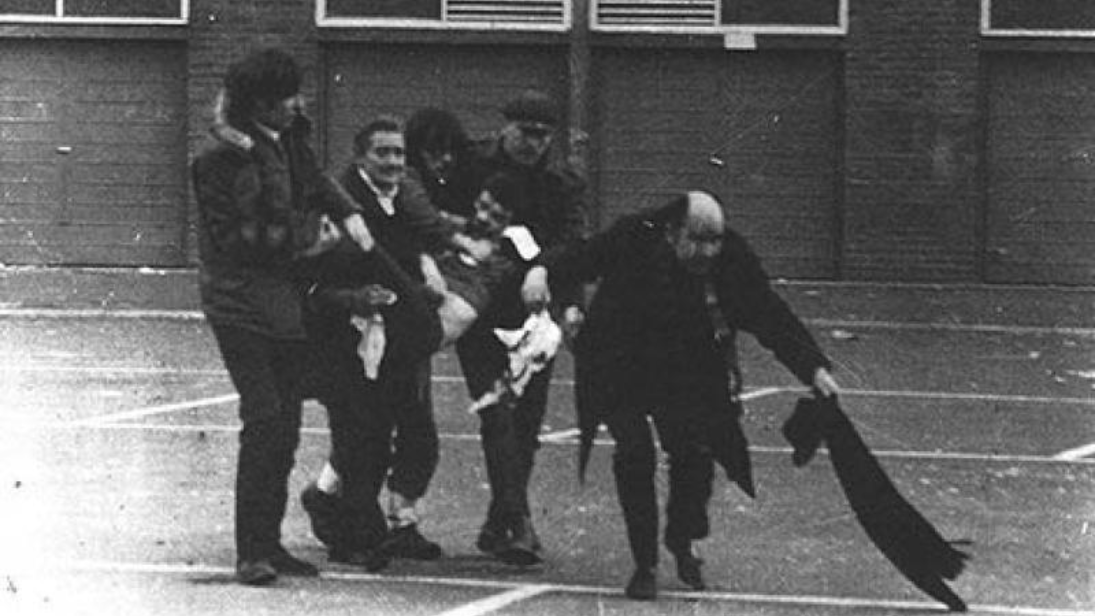 Wings "Give Ireland Back to the Irish" (1972)
Wings "Give Ireland Back to the Irish" (1972)
On Sunday 30 January 1972 in Derry British paratroopers shot 26 unarmed men taking part in a demonstration against internment, 13 of whom died immediately with another dying later. Unsurprisingly this caused outrage and led to a surge in IRA recruitment. Paul McCartney's Wings rushed this song out as their protest against the paratroopers' actions. It is a strangely anodyne offering, failing to communicate any real sense of shock and anger at what had just happened and featuring lyrics and a tune that are all pretty fatuous. It was banned by the BBC but still made number 16 in the UK singles chart.
Plastic Ono Band "Sunday Bloody Sunday" (1972)
John Lennon also felt the need to comment on Bloody Sunday and his band released this record, which I had somehow never heard before. Lennon's solo career I mostly associate with schmaltzy piano led ballads so this groover was a pleasant surprise. Unlike McCartney's tune, this actually engages with the events of Bloody Sunday and attempts to communicate a bit more detail about the history of the conflict, albeit from a partial perspective.
The Dubliners "The Town I Loved So Well" (1973)
The Dubliners are not from Northern Ireland (the clue is in the name) but their manager Phil Coulter was a native of Derry. Coulter is often portayed as the bad guy in Irish traditional music narratives: the breadhead impressario with the ear for cheesy pop adjacent tunes and plinky piano flourishes. Yet he wrote this affecting song for The Dubliners, sung here by the legendary Luke Kelly. By now the penny was beginning to drop that the Troubles were not going away any time soon. The song nostalgically compares the pre-conflict era, warts and all, with the disconcerting present.
 I'm not including any related music but I should also mention the 1975 Miami Showband massacre, whose anniversary fell a few days ago. This saw three touring musicians killed and another two left for dead by loyalist paramilitaries. Following this horrific event many bands gave up on playing gigs in Northern Ireland.
I'm not including any related music but I should also mention the 1975 Miami Showband massacre, whose anniversary fell a few days ago. This saw three touring musicians killed and another two left for dead by loyalist paramilitaries. Following this horrific event many bands gave up on playing gigs in Northern Ireland.
Boney M "Belfast" (1977) Boney M were a vehicle for German record producer Frank Farian. They had already had a hit with a song about Depression-era gangster Ma Baker and would go on to release one about Rasputin, so why not a disco song about the horrors of the Northern Ireland conflict? This song could really do with a spoken word breakdown explaining the Troubles or a closing explanation along the lines of "Oh, those paramilitaries" but it's still a classic and with a few lyric changes could surely become a theme song for the Belfast tourist board.
Stiff Little Fingers "Suspect Device" & "Alternative Ulster" (1978)
Anyone who has scene the brilliant film Good Vibrations will be aware that punk was a big deal in Northern Ireland, with some even claiming that punks played an important role in keeping Belfast's city centre open at a time when many were afraid to go out after dark. Stiff Little Fingers were not shy about railing against the shit situation in which they found themselves, with "Suspect Device" skewering the paramilitaries promising a bright future while "Alternative Ulster" seems more hostile to the forces of the state. These could be the two best songs in this compilation.
Gang of Four "Ether" (1979)
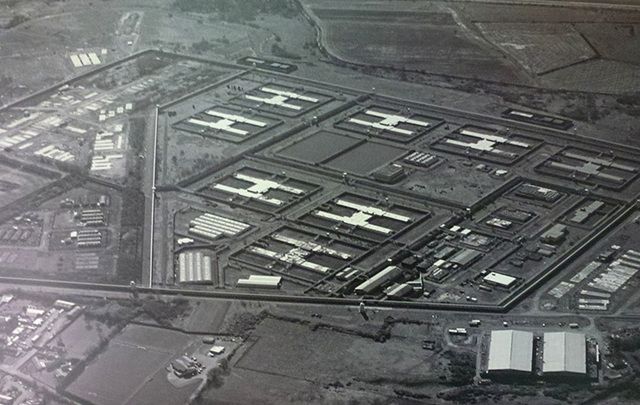 Gang of Four were one of the more political of the British post-punk bands. In this song they evoke the enhanced interrogation techniques British forces took to using on IRA suspects (techniques subsequently recognised legally as torture). The H-Blocks get another mention and the song hints at an economic reason for the British presence in Northern Ireland with its reference to possible oil reserves under Rockall, an uninhabited island north-west of Ireland whose ownership is disputed by Ireland and the United Kingdom.
Gang of Four were one of the more political of the British post-punk bands. In this song they evoke the enhanced interrogation techniques British forces took to using on IRA suspects (techniques subsequently recognised legally as torture). The H-Blocks get another mention and the song hints at an economic reason for the British presence in Northern Ireland with its reference to possible oil reserves under Rockall, an uninhabited island north-west of Ireland whose ownership is disputed by Ireland and the United Kingdom.
Kate Bush "Army Dreamers" (1980)
The song does not mention Northern Ireland but in 1980 this was the only place where British soldiers were fighting or dying, something that was probably not lost on the half-Irish Bush.
Eric Bogle "My Youngest Son Came Home Today" (1982)
Australian folk singer Eric Bogle is best known for his anti-war songs dealing with the futility of fighting for the British Empire, notably "And the Band Played Waltzing Matilda" and "The Green Fields of France". Here he gives us an anti-war song about the Troubles, which I first heard sung by Billy Bragg. I gather this has subsequently been adopted by Irish Republicans; if so I think they understand the lyrics differently to me, as I hear the song as articulating the pointlessness of dying for the IRA.
Fun Boy Three "The More I See (The Less I Believe)" (1983) The lack of any coherent message here is what appeals to me about the lyrical content, with the vocals just enunciating a sense of "what the fuck, that shit is fucked up" while the music has an appealing post-punk oddness to it that makes me want to explore further this band's work.
U2 "Sunday Bloody Sunday" (1983)
They used to say of peak-era method actors like Marlon Brando that you might not know what they were saying, but you definitely knew what they were feeling. And so it is here with Bongo and his buds. Reputedly the song has its origins in U2 being scheduled to appear at New York's St. Patrick's Day Parade but then withdrawing on discovering that the honorary grand marshal was likely to be deceased IRA hunger striker Bobby Sands. Like Edwin Starr's "War", the song uses the classic device of combining anti-war lyrics to a martial beat.
Paul Brady "The Island" (1985)
Strabane-born Paul Brady started life as a folkie but over the years moved in a far more lucrative AOR and pop direction. This is another song about the pointlessness of the struggle, with Northern Ireland compared to Lebanon (very much the poster child at that time for countries tearing themselves apart in internecine violence), with Brady contrasting his disdain for the IRA's struggle with his longing for a bit of seashore shagging. I could probably do without the smutty content but I've always liked the piano line in this song, although some consider that the tune veers overly into schmaltz.
 Spandau Ballet "Through the Barricades" (1986)
Spandau Ballet "Through the Barricades" (1986)
Belfast native Thomas "Kidso" Reilly worked for a number of British bands, including Altered Images, Bananarama, and Spandau Ballet. While on a trip home he was out with some friends and happened to fall foul of some British soldiers, one of whom shot him in the back, killing him (the soldier was convicted of murder but released on parole after two years). Spandau Ballet's Gary Kemp subsequently visited Kidso's grave and met his brother; while traveling through West Belfast he was shocked by the sight of "peace line" barricades that separated Catholic and Protestant areas of the city, and so came the inspiration for this song (Joan Lingard's YA novel Across the Barricades might also have played an uncredited part here). The lyrics centre on that great cliche of Northern Ireland fiction, a cross-community love affair. And for all the Yeats-quoting lyrics it is a song I am including here for its noteworthiness but not because I in any way like it. I'm not sure if it is actually bad or if it is just my youthful dislike of Spandau Ballet being impossible to shake off, but it does feel too much like a "lovely song" for me.
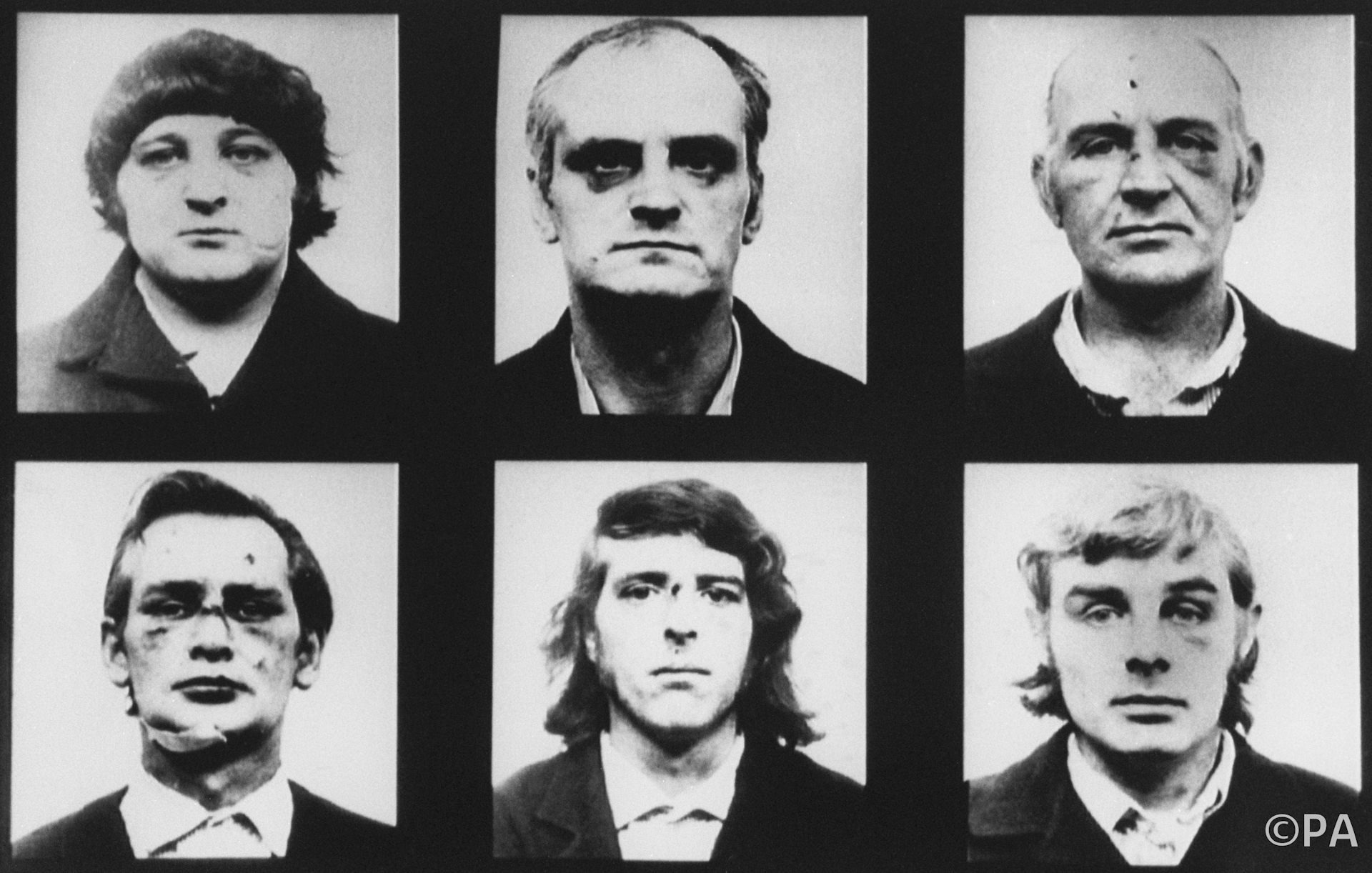 The Pogues "Streets of Sorrow/Birmingham Six" (1988)
The Pogues "Streets of Sorrow/Birmingham Six" (1988)
In the first half Terry Woods sings from the point of view of someone who has had enough of Northern Ireland's political violence and is leaving, never to return. But then Shane McGowan sings of some of those who did leave, the people known as the Birmingham Six and Guildford Four, who were convicted for IRA crimes (pub bombings in Birmingham, Guildford and Woolwich that killed 29 people and injured 320) they didn't commit on the basis of confessions extracted under torture and, in the case of the Birmingham Six, deeply flawed forensic evidence. The Birmingham Six and Guildford Four were subsequently exonerated but when this song was released its subjects were still in prison.Although doubts as to the safety of their convictions were becoming more widespread, suggesting their innocence and the moral corruption of the justice institutions was still controversial, and the Shane McGowan portion of the song was effectively banned from British television.
Simple Minds "Belfast Child" (1989) The title references Belfast, but the song appears to have been inspired by the 1987 Enniskillen bombing, when the IRA killed 10 civilians and one policeman. The melody draws on the folk tune "She Moved through the Fair", while the lyrics are somewhat oblique but suggest a certain "war is bad" sentiment.
Tina Turner "The Best" (1989)
 What, you may be wondering, is this song doing here? Tina Turner has no obvious link to Northern Ireland and the song's lyrics do not suggest any link to the Troubles. But somehow this song became a loyalist anthem, often played when loyalists were celebrating a release from jail or a successfully completed sectarian murder. Loyalists are often portrayed as the irredeemable bad guys of the Northern Ireland conflict, their insularity, thuggishness, reactionary far-right adjacent tendencies and fondness for their links to a country that isn't that pushed about them making it easy to dislike them. There was also their tendency to really go for it with sectarian killings of random civilians, in contrast to the other actors who made a bit more of an effort to go after enemy combatants at least some of the time. And then there is their heavy involvement in the North's drug trade. So it isn't hard to see why some might describe them as simply the best.
What, you may be wondering, is this song doing here? Tina Turner has no obvious link to Northern Ireland and the song's lyrics do not suggest any link to the Troubles. But somehow this song became a loyalist anthem, often played when loyalists were celebrating a release from jail or a successfully completed sectarian murder. Loyalists are often portrayed as the irredeemable bad guys of the Northern Ireland conflict, their insularity, thuggishness, reactionary far-right adjacent tendencies and fondness for their links to a country that isn't that pushed about them making it easy to dislike them. There was also their tendency to really go for it with sectarian killings of random civilians, in contrast to the other actors who made a bit more of an effort to go after enemy combatants at least some of the time. And then there is their heavy involvement in the North's drug trade. So it isn't hard to see why some might describe them as simply the best.
The Cranberries "Zombie" (1994)
One tactic the IRA became quite attached to was detonating bombs in the commercial districts of English towns and cities. In 1993 the IRA hit the Cheshire town of Warrington twice, a few weeks between each attack. The first explosion caused extensive damage but no injuries, but the bombs exploded on 20 March on a shopping street injured 56 people and killed two children (one of them just three years old). Dolores O'Riordan of the Cranberries wrote this song in response. It's easy to scoff at the song's somewhat simplistic anger but I like how the lyrics reference "The Men Behind the Wire" and I feel it does capture the pointlessness of the IRA's struggle at this time. No longer could the Republicans claim to be defending Catholic communities in Northern Ireland and their efforts were not obviously bringing a united Ireland any closer, so it was hard to see what they were still killing and dying for. To many it looked like the IRA's war had become self-perpetuating and was continuing because the organisation's cadres could not see any way of stopping that would not be an admission of failure.
In the shadows though strange things were happening. Back channel negotiations were taking place between British representatives and figures close to IRA thinking, combined with more public discussions between the Irish and British governments and different nationalist-republican political leaders in Northern Ireland. Something was going on, even if no one quite knew what.
By the time "Zombie" was released as a single the IRA had already declared a ceasefire, which lasted until January 1996 before becoming permanent in July 1997, with loyalist paramilitaries eventually following suit. The Good Friday Agreement of 1998 is seen as effectively bringing the Troubles to an end (even though the Omagh bombing later that year by dissident Republicans was the single bloodiest incident in Northern Ireland during the whole of the conflict). Since then the troops have come off the streets, the prisoners have left jail, and the gun has largely been removed from Northern Irish politics, which now revolves around a somewhat dysfunctional but non-violent enforced power-sharing arrangement.
Even so, Northern Ireland remains a divided society, with Belfast reputedly featuring more peace walls now than before the Good Friday Agreement. Northern Ireland's government regularly collapses over issues that seem pretty minor and inconsequential to outsiders. And intermittent street violence remains a thing, with loyalist mobs driving immigrants from their homes in riots a few weeks ago. But compared to the early 1970s it's all pretty quiet.
"Zombie" has had an odd afterlife, becoming a popular stadium song for sports fans from Limerick (the Cranberries' home town) and further afield.
The gun has largely departed from Northern Ireland's politics, but not entirely. The IRA went on ceasefire and eventually left the stage entirely, but various dissident Republican groups attempted to continue armed struggle against British rule. Their efforts have been relatively unsuccessful, although their attacks occasionally kill or injure people, mostly members of the security forces. In April 2019 during rioting in the Creggan area of Derry, dissident Republicans shot at the police and missed, but one of their bullets fatally wounded journalist Lyra McKee. Dissidents have not staged a fatal attack since then, so for now Lyra McKee remains the last person killed in the Troubles.
English folkies The Young'Uns commemorated McKee on their Tiny Notes album. Like all the Troubles' victims she deserves to be remembered as more than just a statistic, with her LGBT activism and investigative journalism making her an inspirational figure. Like the other victims of the conflict, she died far too soon. Some readers might find this song mawkish, but it brings tears to my eyes whenever I listen to it. Born in 1990, McKee came of age when the Good Friday Agreement seemed to have consigned the Troubles to the dustbin of history and looked like someone who represented Northern Ireland's future, except the past still reached out to claim her.
Billy Campbell after being beaten by loyalists at Burntollet Bridge (Derry Journal: "Fifty year ago the People's Democracy organised civil rights march from Belfast to Derry bravely completed its journey")
British troops on the streets of Belfast, August 1969 (Guardian: "Paul Hill’s best photograph: the day troops arrived in Belfast, 1969")
Bloody Sunday: Father Edward Daly waves a white handkerchief as he tries to bring the fatally injured Jackie Duddy to safety (Ulster Museum: Bloody Sunday)
Miami Showband massacre aftermath (Belfast Telegraph: "The Miami Showband Massacre: 'They tried to wipe out the entire band'")
The H-Blocks (Irish Central: "Cillian Murphy, Jamie Dornan and Pierce Brosnan to star in new H-Block Jim Sheridan movie")
Bananarama at Thomas Reilly's funeral (RTÉ Archives: "Kidso Laid To Rest 1983")
Mugshots of the Birmingham Six, showing the beatings they had received after their arrests (The Conversation: "Would the Birmingham Six be victims of miscarriage of justice today?")
Loyalist mural, Belfast (The Clairmont Colleges, Digital Library)
Cupar Way peace line, Belfast (Wikipedia: "Peace Lines")
Emmalene Blake's mural for Lyra McKee, Belfast (CNN: "Belfast mural memorializes journalist Lyra McKee")

